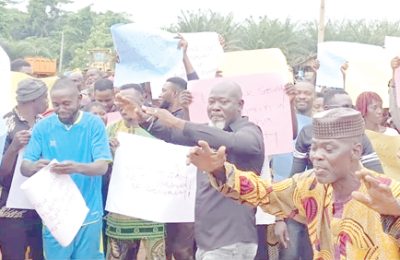

Shuwargwe Damak is the founder and president of Arm the Child Foundation, a non-governmental organisation that empowers vulnerable and internally displaced children with education in the FCT and Plateau State. In this interview by KANGMWA GOFWEN, she speaks about the activities of the foundation and the importance of vocational training.
What motivated you to found Arm the Child Foundation?

Sometime in 2017, I followed members of a book club I belong to, to visit an orphanage home in a remote place in Kuje, in Abuja. When we got there, we had book reading and Q & A sessions with the children. From those interactions, I found out that the children could not speak English Language so I asked the founder of the orphanage if I could volunteer to teach the children communication in English every weekend. Responding, she mentioned that they had just received funding to enrol them in school. However, the idea never left me. A week later, someone posted a video of some internally displaced children in Gwarimpa, so I went on to look for them. From wanting to volunteer to teach them English Language every weekend, I decided to recruit volunteers to join me to teach them five basic subjects (Mathematics, English Language, Civic Education and History) every weekday for one month. That became a summer school project with the tag name “Arm the Child Project”. After the summer school, I identified the need for continuity under a legal structure. So I decided to register Arm the Child Foundation as non-profit organisation.
Arm the Child Foundation was borne out of the desire to give internally displaced and vulnerable children a chance to be reintegrated into society through education. Whenever I see children hawking or begging on the streets, all I think of is who they could potentially become if they were given access to education and the picture I have in my head spurred me to create access to education for vulnerable children.

How supportive is the government to NGOs championing education in Nigeria?

Quite frankly, I cannot definitively state my stance on this because Arm the Child Foundation has never received support from the Government. However, I have seen a number of non-profits in the educational sector partner with some government parastatals to execute different projects.
Additionally, there are certain basic infrastructures that are lacking which makes it challenging for remarkable progress to be maintained in the educational sector. For instance, insecurity in the country particularly in some northern states has caused an increase in the number of out-of-school children. If this continues to linger, how then will Nigeria curb its disturbing number of out-of-school children?
Also, the condition of some government schools across the country is disheartening. I have seen a number of videos of some of these schools and in these videos, you find the children sitting on the floor in classrooms with leaking rooves. In the absence of a conducive environment, how are the children expected to learn? The absence of some of these basic infrastructures does not complement the efforts being made by NGOs to improve on the educational sector
Some are of the opinion that formal education should be combined with vocational education as well. What is your take on this?
When you look at the trajectory of most graduates through the past four years, you will find that we have more self-employed youths and entrepreneurs than employed graduates. The simple reason is that Nigeria has a high population of youths viz-a-viz a high rate of unemployment. Therefore, I totally support incorporating vocational training into the formal education system as this will prepare Nigerian students for self-reliance in the future. Given Nigeria’s challenges of high unemployment and widespread poverty, vocational training can empower students to become entrepreneurs and job creators themselves. Additionally, this will give students who had interests in vocational occupations but were “forced” to go to school, a chance to explore their passion concurrently with conventional education.
Some of the children you work with suffered trauma from events leading to their vulnerability. How has that impacted their learning and how do you support their mental health?
In addition to providing education for children, we have several volunteer psychologists who offer psycho-social support to address mental health issues among the children. We also engage experts in special needs to train our volunteers on techniques suitable for teaching children with past traumatic experiences. This approach has led to notable progress. For instance, when we began working with some internally displaced children in Abuja in 2017, many aspired to become soldiers to return and defend their villages. However, after two years of our intervention, 80% of them had shifted their future ambitions and aspirations.
How many children has your foundation reached out to since its inception?
Arm the Child Foundation has empowered over 1,000 children since its inception in 2017 and we look forward to getting more children empowered in the coming years.
To what level of education do you support these children?
Our goal is to support our beneficiaries from primary school education through tertiary education. Currently, the highest level of education of beneficiaries of our scholarship fund is senior secondary one (SS1). We intend to fund their education till they complete secondary school then we will eventually enrol them in university.
Your degree is unrelated to education, how have you been able to fit into the educational sector?
Intervention for vulnerable children requires different things, the first and most important being the heart to help. I have moved from teaching them myself to working with professionals who are vast in the field of education. Additionally, every year when we recruit volunteers, we get professionals to train the volunteers on how to teach the children and we also give the volunteers a scheme of work that we develop to align with the national scheme of work for secondary and primary schools.
What other activities does your foundation engage in apart from providing educational support to vulnerable children?
We engage in vocation skills’ training, advocacy for child rights and the development of the welfare of vulnerable children. We also engage in charitable outreaches
What are some of the future plans and aspiration of your foundation?
I must say that we have very ambitious aspirations. In the coming year, we intend to launch a project that will advance the cause of girl child education in Northern Nigeria. In the next five years, we plan to scale up the impact of our interventions and extend our reach from FCT and Plateau State to five more states in Northern Nigeria. We also intend to increase the number of our beneficiaries from over 1,000 presently to 10,000 by 2033.
If you had the opportunity to make any changes in the educational system of Nigeria what would that be?
There is a lot I will change. Firstly, I will improve access to digital learning infrastructures for government schools throughout Nigeria. This will come with compulsory training in digital skills for all students of government schools in order to equip them with the requisite technological skills required to meet up with global trends. Additionally, it will also enable them have access to education in times of emergencies for instance, the COVID-19 pandemic disrupted the education of children in marginalised environments and government schools. If they had access to digital learning, that would not have happened.
I will review the subjects offered in schools and their contents. Some subjects no longer serve their purpose and some have stale content so that children are unaware of global trends. I will review the criteria for becoming a teacher, it will become a lucrative job reserved for only professionals. I will also re-introduce History back to the secondary school curriculum, no student should be absolved of the history of their country.
READ ALSO FROM NIGERIAN TRIBUNE








